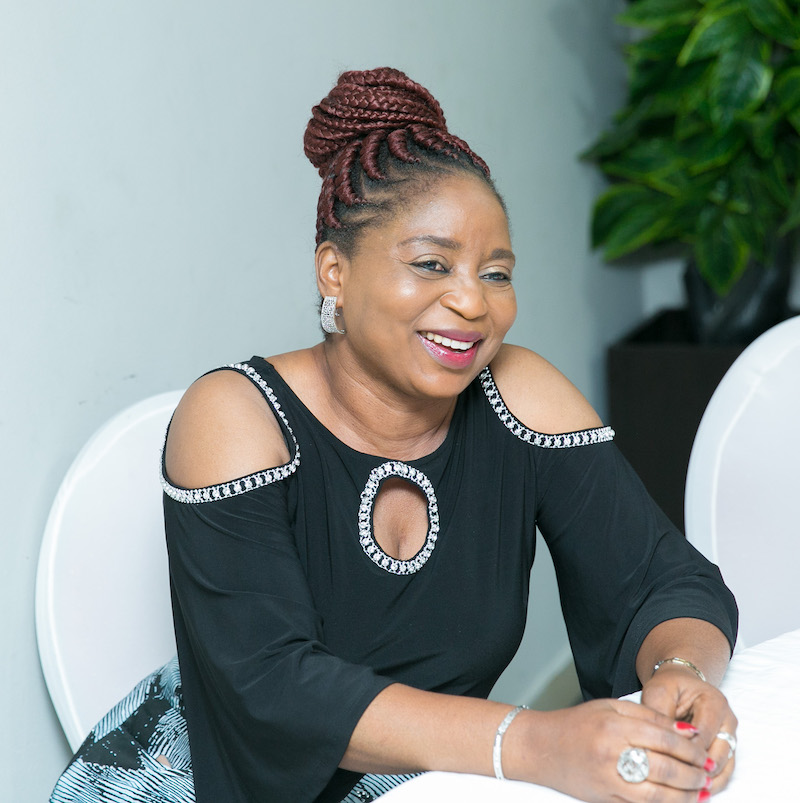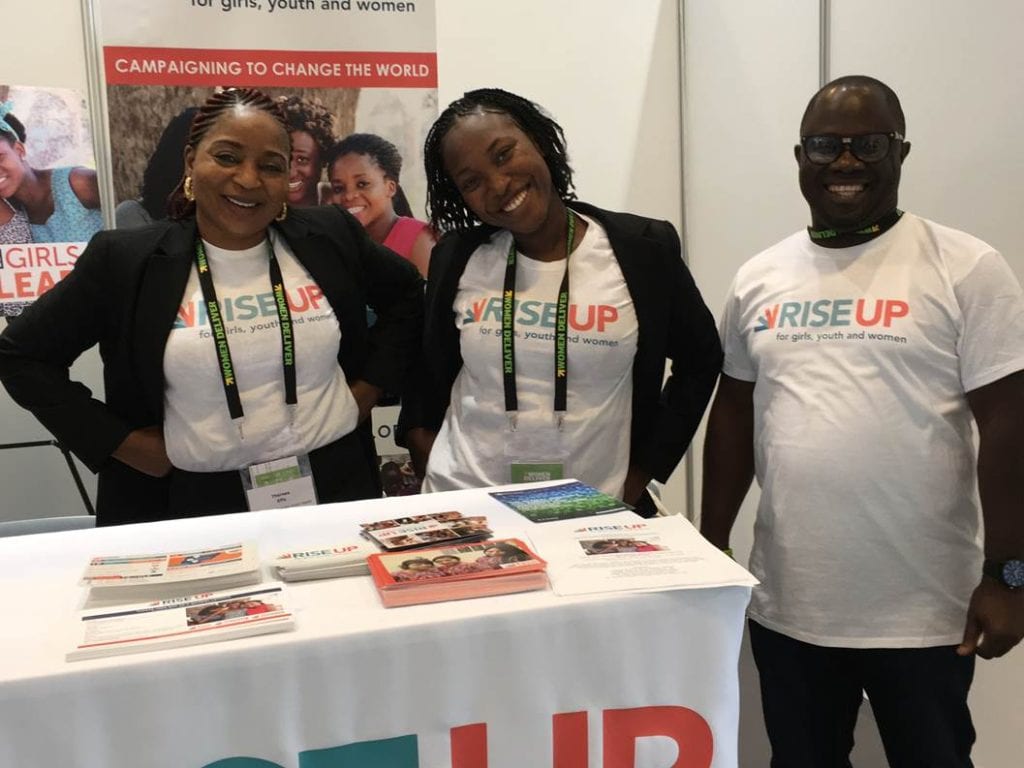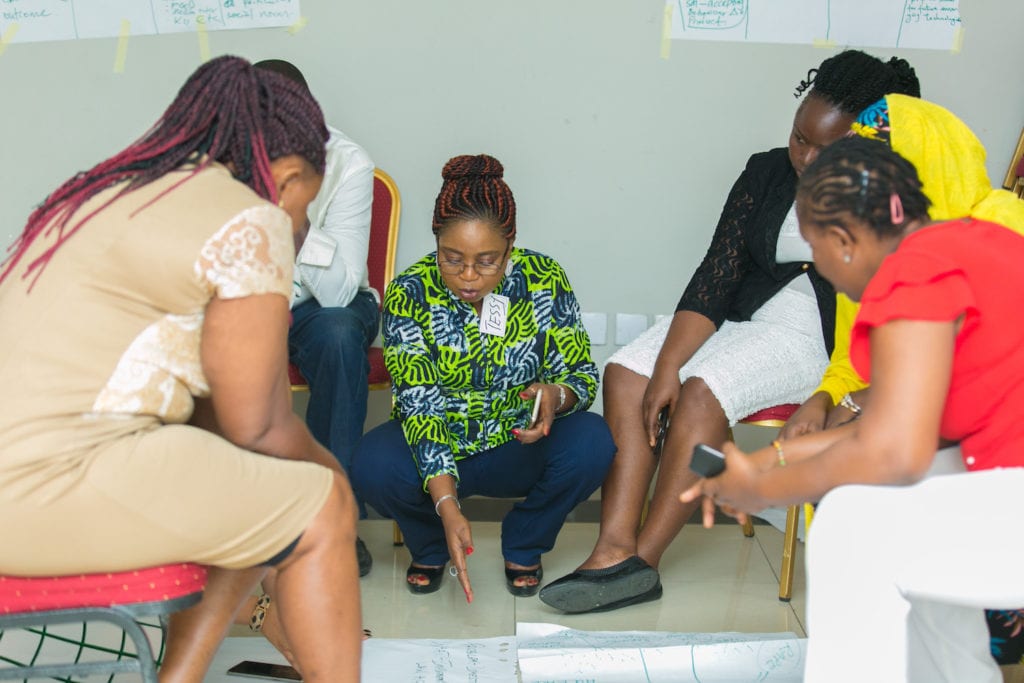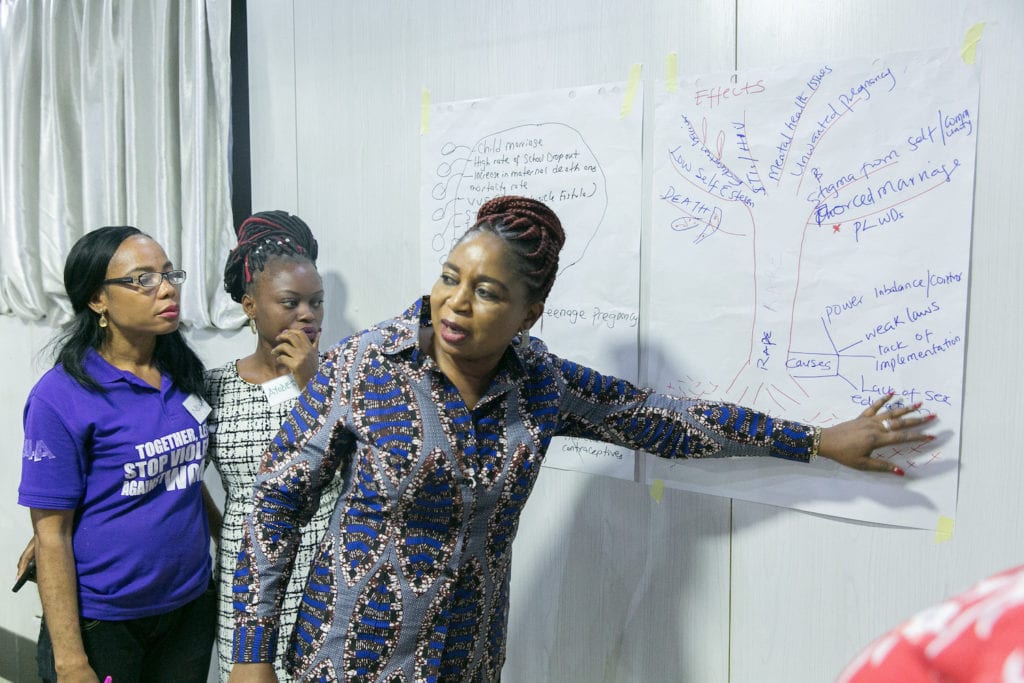Theresa Kaka Effa is based in Abuja, Nigeria and is a reproductive, maternal, newborn, child, and adolescent health (RMNCAH) advocacy expert. She has led the formation and strengthening of several national and state-level civil society networks and has participated in the development and review of successful RMNCAH policies with numerous civil society and government stakeholders in Nigeria. Theresa holds a bachelor’s degree in Theatre Arts, a master’s degree in Public Administration from the University of Calabar, and a degree in Mass Communication from Bayero, University Kano.
We sat down with Theresa to talk about her powerful work as Rise Up’s Nigeria Country Director, including her inspirations, proudest accomplishments, and advice for fellow leaders seeking to drive change in their communities.
 Tell me about how you first became involved with Rise Up?
Tell me about how you first became involved with Rise Up?
In 2013, a colleague of mine sent me Rise Up’s call for applications for the Nigeria Country Representative position with Rise Up’s Champions for Change Initiative. She thought I would be a fit and encouraged me to give it a shot. I had heard about Rise Up’s Let Girls Lead model through the Bill & Melinda Gates Foundation. I was a Senior Program Officer at the time with a national NGO and upon being selected for the Country Representative position and introduced to Rise Up’s model, I was so happy to work with an organization that focuses on girls and women. I was already working with civil society leaders in policy and legislative advocacy, which I knew was a successful approach. I particularly liked how Rise Up was amplifying girls’ voices and using storytelling to advance issues affecting girls and women.
In your work with Rise Up leaders in Africa, what do you find motivates you most?
The civil society leaders’ resilience, dedication, and passion to move things forward for women and girls. I love when the leaders come to the realization that working together with each other’s strengths and identifying champions in their communities can lead to sustainable change. The political terrain is difficult—there’s constant change with politicians and the positions they hold. One day you’re advocating with one decision maker, the next day he is out of office and you have to start over. For me, being motivated to see change happen is a strong point to continue to work with these leaders.
What accomplishments are you most proud of?

I am proud to be in the policy advocacy and legislative space, working to create an enabling environment for women and girls to thrive. My biggest accomplishment is helping to establish policies that create health services and uphold the rights of girls and women. I was a key civil society leader involved in the passing of the National Health Act, which provides a framework for citizens to hold local, state, and federal governments accountable on their responsibility to deliver quality health services to all Nigerians, especially to marginalized girls, women, and the elderly.
During the onset of HIV and AIDS in Africa, when people wouldn’t talk about it, I was part of an NGO group that put messages together using drama, storytelling, and theatre for citizens to understand and begin to discuss it. Since then I have been involved in the development of policies and plans around RMNCAH, sexual reproductive health, family planning, and HIV/AIDS. I am especially proud of working with and supporting civil society leaders to move these issues forward with Rise Up, providing technical assistance to them so they can advance and bring to light issues that affect women and girls within their local communities.
I can say another accomplishment is being a role model for younger women. I have mentored girls for a long time. One girl in particular that I trained as a peer health educator and mentored over time is now a strong international activist in climate change and gender equality, and that makes me proud.
What are the biggest challenges for women and girls that you see in the communities you work in?
First of all, being a girl is a challenge in many communities. We still belong to communities that believe the male child is more valuable than the girl child. It is so important for me to be a role model and proof that the girl child should be valued as well. Next, teenage pregnancy and early marriage (which are inherently linked), a lack of women in leadership positions (such as civil society organization roles, political positions, or at corporations), and a lack of economic independence and access to inheritance—these are all big challenges I see women and girls experience.
Things are changing thanks to civil society groups and thanks to the kind of work we do at Rise Up. You now see laws that have been put in place to address some of these situations and injustices. And we are not just putting laws in place, we are implementing them and enforcing them. Nigeria is a big country, made of 36 states with separate cultures and different aspirations; I think we’re moving slowly forward together. This is what sustains us in the development world: we celebrate progress, and one day we will all access equal opportunity and enjoy equal rights.
What inspires you to be so active in advancing health, education, and equity for women and girls?

I have a personal story to tell you. When I was in senior secondary school at age 14, my friend was married off to a man old enough to be her father and she dropped out of school. She was my childhood soulmate, my best friend. And this was one of several cases like this that I had seen around me. It hurts to remember this story, but it is also an inspiration that keeps me in the work that I do with Rise Up.
I feel strongly that if women are given the chances that men are given, they will do even better. There are thousands of girls out there that don’t have that opportunity. My friend later continued her education and got a divorce, long after I had finished my university education. I am proud of her tenacity to be able to pick up the pieces and complete her education.
I’m very big on education. My father instilled that in me, saying, “I don’t have material things to give to you, but I have an investment to give you and that investment is your education.” I came to realize as an adult how real that is. All six of my sisters and my only brother graduated from university and some completed a second degree and were gainfully employed before my father passed in 2005. My message always to other accomplished women is that there are so many brilliant girls out there—what can we all do to ensure that they have the opportunity we had to go to school and live their full potential?
I can’t stand social injustice, in whatever form or situation, even at the local market. Say that I see a situation where, because it’s a woman or a girl, someone is being deprived of their rights, I speak up because I want to change this bias and get across that a woman is a human being and must be allowed to express her rights and receive her entitlements.
What changes have you seen in the leaders that have gone through Rise Up’s programming? What advocacy policy impacts have you witnessed?
Civil society organization leaders that go through Rise Up’s trainings became more focused, determined, and more energized to speak up. I see them attending meetings and joining national committees, and insisting on policies and drawing attention to the rights of women and girls.
I see that they now understand what it means to educate policy makers. Before these civil society organization leaders were involved with Rise Up, they saw advocacy as merely spreading awareness, but now they know it is really about engaging policy makers and educating them—that this is what will lead to changes beneficial to humanity.
One leader, after going through Rise Up’s training, identified that the government in one of the northern states had not adopted a national policy that provides human resources to train community health workers to administer family planning commodities. This task was reserved for trained nurses, but because nurses were only located in urban cities, most women in rural settings didn’t have qualified help and access to family planning commodities. Training the health personnel—the community health workers—to provide these services was critical.
Another Rise Up leader in the same state simultaneously worked with the state government to make funding available for health services for women and children. The Kano state government had made pronouncements to provide free maternal care for pregnant women and children under five, but they weren’t backed by a budget or funding. I provided these leaders and their organizations with technical support and monitored their grant activities and strategies to enable them to advocate for these issues and build the capacity of women and girls to hold their government accountable and ensure policies were implemented properly.
I’ve seen impacts on teenage pregnancy, abortion, and provisions for SRH services, as well as impacts from community education on STIs and reducing the stigma young people face to get them treated. All of this motivates me to continue my work.
What is your advice for anyone wanting to make a lasting impact in their community or country?

First, my advice is to go to the people, work directly with the people. Identify champions and opinion leaders within the community. Believe in local solutions—most people know their problems and have an idea what the solution should be, they may just not know how to go about it or who to talk to. In Nigeria and most African countries, most people are uneducated on civil rights and how they can uphold their rights. What Rise Up does with the local leaders—not telling them what is right, but working with them to empower them to come up with their own solutions—enables them to demand their rights. Of course, in some communities there are strong religious or cultural barriers. This is why it is very important to work with religious leaders, to listen to them, to chat with them, with the goal that they will come to determine what is right and wrong and be more encouraged to embrace change.
What future goals are you passionate about?
Personally, I see myself retiring to my first love—the theatre. I trained as a theater artist and I use those skills in the work that I currently do. Advocacy includes art and storytelling, as we are enabling leaders to appeal to people in power and influence decisions. I use this medium of art to do social justice work too, as well as to influence and educate the public. I use it to impact policy makers on women’s rights and power.

